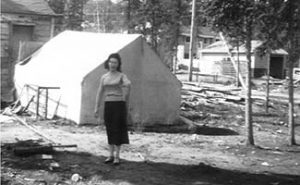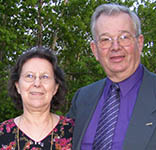Years later while riding in a motor boat Rita Anderson watched the ruggedness of the virgin forest along Lake Athabasca’s northern shoreline, mile after mile. “I wondered … how did God find me here?”
Here are excerpts adapted from Rita Anderson’s new book. You will want to read her story in its entirety. But we think that even these few pages reveal her heart – someone saved and living by God’s grace. Rita’s book is also a personal glimpse into Canada’s First Peoples – struggling with change, and needing new life found only in Christ.
by Rita Holmgren Anderson
My village is located halfway up on the north shore of big Lake Athabasca, in a sheltered cove hidden from the world. You cannot see it until you go through the narrows, around the bend and between the hills. On a secluded bank sat our homes in a neat little row. The village consisted mostly of my uncles, aunties, cousins and their large families. We lived, loved, laughed, played, held each other when we hurt.
Sheltered from the World
When I was young no one came to visit us that was not related – no one except the Hudson’s Bay manager’s family, the school teacher’s family, and Jacksire, a bachelor with one leg who played the jaws harp for us, and the priest. These were the only white people besides my father from Sweden.

Rita in her back yard in Uranium City, Saskatchewan.
We had each other and the big outdoor world as our playground. No one told us where to go or not to go; we lived without boundaries. It was a special place, a beginning which will last a lifetime in my heart. Each day was the same: hunting for caribou, fishing or picking berries. The woods gave us our heat and shelter; the lake, our water and fish. How well you lived showed how hard you worked and proved how good a provider you were.
We lived a couple of days away by boat or dog team from the nearest town or village. It took six hours by small plane ride from Edmonton, Alberta. There was no need for anyone from the outside to come to our village. A plane came every so often with mail and deliveries. There was nothing there but us, a Cree Métis village.
Why Did He Come Here?
Then one day a small plane landed and a tall, young, skinny white man got out of the plane. Everyone said, “Who is he? Why did he come here?”
The high officials of the village, namely my aunts and uncles, said, “He won’t know how to live in the bush. Crazy fool, hope he doesn’t kill himself out here.” Everyone watched closely from our kitchen windows as we checked him out. A few other families lived around the bend of the bay and he told them he came to tell us about Jesus. All we knew was that he was a Protestant. That meant he was different.
We watched him haul logs for the small home he built, haul wood for the winter, and haul water from the lake. No one went to visit him. He had to prove he was worthy to sustain himself and not to depend on others in the village.
His wife came when their log cabin was built. Together they endured the long, forbidding winter of distrust of the Cree people of the village. She went out to Edmonton to have their first child and then came back with the little bundle. “Why would you bring your baby to where no one knows you and you had no family?” my mother wondered.
Ray Bradford was definitely the talk of the village. We were warned never to go to his place. “He is the devil,” they said. “If you look really close you can see the horns starting to grow out of his forehead.”
Being just a young child I had no fear and wanted to know the truth. So we set out to the missionary’s home. One does not know how long you have to wait for horns to grow, but felt we waited long enough to know … that we had solved the mystery. But I don’t remember going back.
As the years passed Ray & Cathy Bradford became respected among my people and welcomed into our homes. They stayed in Camsell Portage for a number of years until Uranium City sprang up, and then moved there. Their love for the Lord was stronger than the loneliness, the language, the isolation, the ridicule, the hard work of struggling and surviving in the wilderness that takes but gives nothing back in return.
Being Different
My father took a job at one of the newly opened uranium mines, so we moved. He worked building timber head-frames. I found myself in an all-white school. Gone was the one-room school house with all my cousins. Talk about being intimidated … I don’t think I did anything except watch everyone for the first few days.
The people who lived there were different, a lot different. They were from the outside world and knowledgeable about current events. They were “citified” (a northern term), spoke different languages and they were used to a better or different way of life.
We were different; we looked, dressed, even smelled different. They had running water, took baths and showers; we had the lake. We washed our faces in the same water in the basin by the outside tree stand. Their clothes looked new and crisp; we wore ours for a week and smelled like a camp fire. Changing clothes often was not an option because we had to haul our water from the lake and wash clothes in a tub and washboard outside. Sometime later I do remember Mom washing clothes down by the lake with a gas motor washing machine.
Friends were not an option. We had nothing in common. They had big houses; we had our tent. Did I mind being different? No. Did I want to be like them? No. I was from the outskirts of town and liked it very much, thank you. I didn’t understand their way of life. Mine was safe and comfortable.
With the little money we had, we bought a small one-room tar-paper shack. An oil-burning stove sat in one corner by the door. Across from that were open shelves for cupboards and a small table with a couple of wooden chairs. Our double-bed, at the other end where my sister and I slept, filled the width of our new home. It served as a bed-couch in the daytime. On the other side was an attached tent with a wooden floor and wood frame halfway up.
We spent many close moments talking together; supporting each other in our one room tar-paper shack.
A few years later tragedy struck when Rita’s dad died in an accident. Only Ray Bradford was willing to officiate the funeral. Rita remembers, “Something in my heart stirred toward this man and his actions toward Mom and us. Mr. Bradford was not ashamed to come into our broken-down tar paper shack. I thought to myself that this is how God would be. He would demonstrate His love to the undeserving and not walk by.”
Rita goes on to tell of her young adult life as a restaurant waitress in Uranium City, of family and social challenges … and of meeting a young man named Lyle Anderson!
Another World
Living in a mining town was a bit rough. Being a young girl and a “half-breed” with alcoholic parents made life a lot more challenging, but I would not have had it any other way. It helps me to see and understand, feel love and compassion towards people who are hurting … I love the life I came from; it is my heritage. It is a gift from the Lord.
After the initial shock of Lyle’s choice of girlfriend wore off, his family loved me and treated me with nothing but respect, support, and kindness. Although our relationship was off to a slow start it continued to grow. Lyle was into a crash course about my Métis family lifestyle. I was in my slow process of learning the white man’s way of thinking, which I still don’t understand at times, and which is a little complicated compared to my simple way of life.
Lyle’s family lived in Uranium City, and he worked as a surveyor for the Eldorado mine. He had strayed away, but started going back to Ray Bradford’s missionary church and I began attending with him. I walked through the doors of the church that I had for so many times walked by. Would I find God here, the God of the unfortunate, unworthy, lost and dying?


Rita & Lyle Anderson
What happens when two worlds collide? Rita’s book reveals the struggles and heartaches, but she also answers with … “Something beautiful!”
Lyle & Rita Anderson served full-time with NCEM in the 1980s and since then (as an associate missionary) Rita has been part of our Tribal Trails TV ministry.
“Yesterday” is available from our Tribal Trails Bookstore in Prince Albert. Please call 306-764-4490.
(from Northern Lights issue #534). Note: some of the locations and involvements of our missionaries may have changed since the original publishing of this article.

